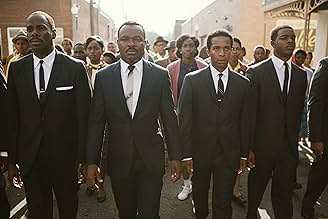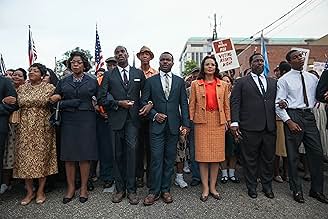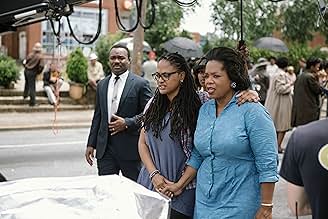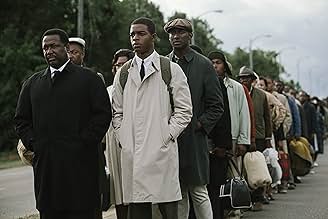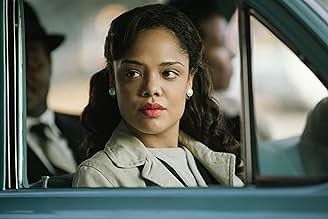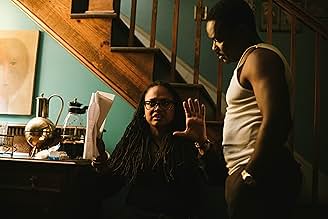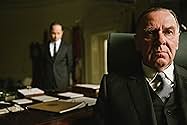Eine Chronik von Martin Luther Kings Kampagne für gleiches Wahlrecht mit dem legendären Marsch von Selma nach Montgomery, Alabama, im Jahr 1965.Eine Chronik von Martin Luther Kings Kampagne für gleiches Wahlrecht mit dem legendären Marsch von Selma nach Montgomery, Alabama, im Jahr 1965.Eine Chronik von Martin Luther Kings Kampagne für gleiches Wahlrecht mit dem legendären Marsch von Selma nach Montgomery, Alabama, im Jahr 1965.
- 1 Oscar gewonnen
- 58 Gewinne & 91 Nominierungen insgesamt
- Girl #5
- (as Nadej Bailey)
- James Orange
- (as Omar Dorsey)
Empfohlene Bewertungen
This story is part of a huge moment in American history. A really powerful subject which is thoughtfully dealt with. The lead, David Oyelowo, does a nice job.
There is one moment in the film which is hugely emotional and shows the best of human kindness but otherwise the movie doesn't quite pack the huge emotional punch the topic deserves.
Still very much worth a watch though, the subject matter is fascinating. You will struggle to believe that humans could behave this way, and so recently too.
I foresee a bright future for the director Ava DuVernay and actor David Oyelowo. For DuVernay's second or third effort, it's quite an achievement what she manages to do with this film. For nearly fifteen years she's been working in studio marketing and publicity and her film speaks for itself. She directs the film with flare and keeps the film emotionally grounded. Even though at times you think you know whats coming, DuVernay keeps us at bay and also provides us with some neat surprises. Also give Paul Webb some credit with his sharp screenplay.
David Oyelowo truly embodies MLK. More often than not Selma tends to focus on something not many people tend to expect in a movie about MLK. The script showcases his doubts and insecurities. Oyelowo comes through with a deeply felt and compelling performance. He also nails Dr. King's speech patterns, voice, even his posture and shows that Dr. King has his flaws, but is a compassionate person. I find it hard that anyone will be able to take their eyes off him. What a performance. Shame that it was overlooked by the Academy.
Everyone in the cast brings their "A-game." I liked Carmen Ejogo as Coretta Scott King, but I wanted just a little more of her character, but she makes up the most of what she has. Oprah Winfrey is solid as Annie Lee Cooper. She has a very substantial role and has a nice subplot. Other particular standouts are Tom Wilkinson as President Lyndon B. Johnson, Tim Roth as George Wallace.
Selma takes itself very seriously, there isn't much humor to be found, and any break from documenting its events are often downbeat character moments. However DuVernay's talent is in full blaze. This film is very heavy, but it always grabs your attention, often in the hands of Oyelowo's performance. The March 7th, "Bloody Sunday" sequence is brutal to watch, but DuVernay and cinematographer Bradford Young achieve and deliver quite an intense and impactful set piece. Literally, it hits you in the gut as we watch history forged in flesh and blood.
I am still shocked that this film received so little recognition by the Academy. Oyelowo and DuVernay should have been nominated at the very least. I believe you can blame that to Paramount Pictures as I heard that they did not deliver the screeners on time for the Academy voters. It's a pity.
By the time we arrive at the film's postscript, revealing the fates of several people chronicled by Selma, it's almost impossible not to be moved by their courage and sacrifice. Selma to me, is not just a biopic, but rather a film that celebrates a community action through the eyes of Martin Luther King Jr. This movie sadly, could not be more relevant right now.
9.3/10
Admittedly it is a little bit sad that a film about civil rights can still have so much relevance in 2015, but such is the way of prejudice and bigotry in all of its ever changing forms. Selma does a fantastic job at making this fight as real and accessible as possible, highlighting this struggle on a personal level for King and his associates. These events were well before my time, but as far as I know this film paints a very realistic picture of the time, from the look of the sets, the costumes, and the emotions and tensions filling the air.
At the end of the day, though, it's the portrayal of Dr. King that drives this film home. David Oyelowo is a powerhouse that carries this film with a startlingly accurate representation of the reverend; one that is filled to the brim with passion and poise, while also breaking down the larger than life illusion that surrounds the man, and bringing him down to earth as the very real and very flawed human being he actually was. His controversial decisions are touched upon in the film, as well as his infidelities which truly bring him to the human level.
It's a damn good thing that Oyelowo can carry this film, too, as the emotional prowess of the story relies solely on him. Selma is packed with a great supporting cast with everyone from Tom Wilkinson to Tim Roth to rapper Common, but there is no denying that all these supporting players play second fiddle to Oyelowo. If Oyelowo is at a 10 as the lead of the film the rest of the cast sits at an 8 across the board with no one character getting a lot of attention as the focus consistently remains on King. I would have liked to see some more attention turned towards the supporting cast, but with a biopic on one of the most influential names in American history you almost have to expect this.
Selma highlights a grim portion of our history, one so grim that it needs to be immortalized in film so that we don't forget the troubled history we came from. This is an incredibly important film about an incredibly important man. It's not something you watch for entertainment value and not something you watch over and over again, but it is something you need to watch to gain some highly accurate perception of a crucial time in history it is imperative we never forget.
David Oyelowo's portrayal of Martin Luther King Jr. was so spot-on that I was immediately drawn in to see every detail of the film play out. I was disturbed and further curious at the same time amongst every scene that unfolded during the key moments of the film.
Basically, it featured how much King sacrificed and went through in the 1960s to maintain blacks rights to vote and eliminate segregation from all states. I couldn't believe how much violent injustice and racial discrimination were used to intimidate innocent people who were trying to have the same rights like many in America.
Oprah Winfrey, Cuba Gooding Jr, and rapper-actor Common brought out great performances as the individuals who stood up for what they truly believe in and they wouldn't let hate stand in their way. Tom Wilkinson's portrayal of President Lyndon B. Johnson was rather physically uncanny and his scenes brought out the angst of what he had to face at a time when violence was further escalating during the Civil Rights Movement. Tim Roth as Governor George Wallace made me feel to hate the man for his segregationist beliefs, but when confronted by President Johnson himself, it just got real.
The juxtaposition of real-life archive footage in the movie gave a nice touch to how very genuine these people of Selma endured plenty of horrible confrontations. Whether these usually ended in violence or even death, they just kept growing in numbers and overcome all who stood against their true beliefs in racial equality.
My only nitpick was that of President Johnson's confrontations with Martin Luther King himself. I've learned in the history books that they've had their fair share of disagreements, but nothing this intense as shown on screen. Nevertheless, it proved that being an American President was no easy feat at a very difficult time. Overall, this is a film that didn't require lengthy (moving) MLK speeches, instead it focused on tense confrontations black people had to endure and how one individual stood tall and fought back not with violence, but with powerful words and strong beliefs. I applaud David Oyelowo and director Ava DuVernay for providing a glimpse into how racism was overcome by one profound man whose legacy still reverberates to this day.
March 7, 1965 is known as Bloody Sunday and marks one of the most despicable moments in U.S. history. It was also a turning point in the Civil Rights Movement and can be viewed as shrewd strategy from Martin Luther King, Jr. and his organization, the Southern Christian Leadership Conference. The movie makes it clear that MLK had a full understanding that Selma, Alabama and it's racist, redneck Sheriff Jim Clark provided the perfect opportunity for a violent reaction to King's demonstrations and protests. It also makes it very clear that there was boundless ignorance, hatred and racism on the part of many southern whites. If the subject matter is somehow not enough to grab your attention, the startling event that occurs 5 minutes in will surely leave you shaken.
The film does an outstanding job of focusing on two pieces of this most complex puzzle: 1. the boots on the ground – the grass roots movement of the people, and 2. the ongoing political debates occurring between MLK and LBJ, between LBJ and his staff, and between MLK and his lieutenants.
The Civil Rights Act had already been passed, so the efforts were in hopes of overcoming the obstacles faced by southern blacks who wished to vote. One of the film's best scenes has activist Annie Lee Cooper (Oprah Winfrey) trying yet again to have her voter registration processed, but being rebuffed by a county clerk through an impossible Q&A session. These intimate moments are where the film excels: Coretta questioning MLK on his love for her, MLK speaking with grandfather of Jimmie Lee Jackson outside the morgue, and MLK turning down the proposal of US Attorney John Doar (Alessandro Nivola).
In an odd twist of casting, four of the leading characters are played by Brits: David Oyelowo as MLK, Tom Wilkinson as LBJ, Tim Roth as George Wallace and Carmen Ejogo as Coretta Scott King. All four are excellent, but it's Mr. Roth as the racist-beyond-belief Alabama Governor Wallace that is the most slitheringly evil, while Mr. Oyelowo gives what can only be described as a towering performance of the man many of us know only from history books and news reels (and a January holiday).
The supporting cast is vast and talented, and because the story spends so much time on the individuals, many of these spend little time on screen. In addition to Andrew Young (Andre Holland), Reverend Hosea Williams (Wendell Pierce), J Edgar Hoover (Dylan Baker), and Lee C White (Giovanni Ribisi), we also see activist Diana Nash (Tessa Thompson), CT Vivian (Corey Reynolds), John Lewis (Stephen James), and Judge Johnson (Martin Sheen). The most bizarre moment has Malcolm X (Nigel Thatch) in a quasi-Mr Rogers depiction as he discussed his new found approach with Coretta.
The original King speeches are owned by another studio so those delivered here by Oyelowo have been re-written and revised, yet the words and Oyelowo's powerful oratory deliver the message loud and clear. While it can be argued that the film delivers only one point of view (the FBI was no friend to the movement), it can just as easily be argued that previous films have done the same thing – only from the "other" perspective (Mississippi Burning, Ghosts of Mississippi).
In what can be viewed as the first serious movie on Martin Luther King, director Ava DuVernay announces her presence with authority. She will have no need to return to her career as a movie publicist, and we will be watching to see what type of projects appeal to her after this. In a brilliant move, the story focuses on a period of just a few months in 1965, rather than tackling the MLK legacy. She presents him as a man with strengths, flaws, doubts, and determination. It's clear why so many followed him, and it's all the more painful to know that so many resisted.
Wusstest du schon
- WissenswertesThe explosion in the opening scene is the infamous 16th Street Baptist Church bombing, which occurred in Birmingham, Alabama on September 15, 1963. The 4 young girls killed in the bombing were Addie Mae Collins, Denise McNair, Carole Robertson, and Cynthia Wesley.
- PatzerWhen MLK meets with LBJ in the Oval Office, Johnson is seated at the Resolute Desk. When Lyndon B. Johnson took office in 1963, he found he was too large for the desk, and commissioned a plainer replacement which was built by the Senate cabinet shop.
- Zitate
Martin Luther King Jr.: [somberly yet passionately speaking to church congregation at a funeral] Who murdered Jimmie Lee Jackson? Every white lawman who abuses the law to terrorize. Every white politician who feeds on prejudice and hatred. Every white preacher who preaches the Bible and stays silent before his white congregation. Who murdered Jimmie Lee Jackson? Every Negro man and woman who stands by without joining this fight as their brothers and sisters are brutalized, humiliated, and ripped from this Earth.
- Crazy CreditsMartin Sheen is not listed in the credits.
- SoundtracksOne Morning Soon
Written by Traditional
Performed by Joyce Collins & Johnita Collins
Courtesy of Tompkins Square, LLC
Top-Auswahl
- How long is Selma?Powered by Alexa
Details
- Erscheinungsdatum
- Herkunftsländer
- Offizielle Standorte
- Sprachen
- Auch bekannt als
- Selma: el poder de un sueño
- Drehorte
- Selma, Alabama, USA(foot of Edmund Pettus Bridge - scene of Bloody Sunday)
- Produktionsfirmen
- Weitere beteiligte Unternehmen bei IMDbPro anzeigen
Box Office
- Budget
- 20.000.000 $ (geschätzt)
- Bruttoertrag in den USA und Kanada
- 52.076.908 $
- Eröffnungswochenende in den USA und in Kanada
- 571.450 $
- 28. Dez. 2014
- Weltweiter Bruttoertrag
- 67.782.762 $
- Laufzeit2 Stunden 8 Minuten
- Farbe
- Sound-Mix
- Seitenverhältnis
- 2.35 : 1
Zu dieser Seite beitragen








